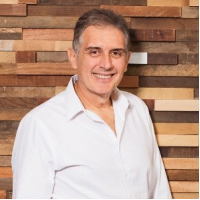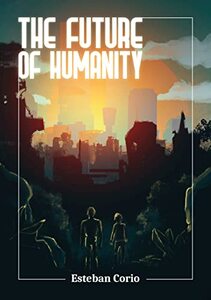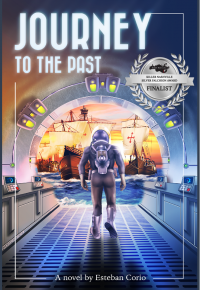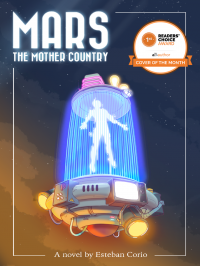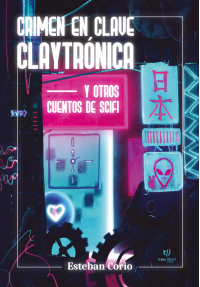Esteban Corio Interview Published on: 08, Jan 2021
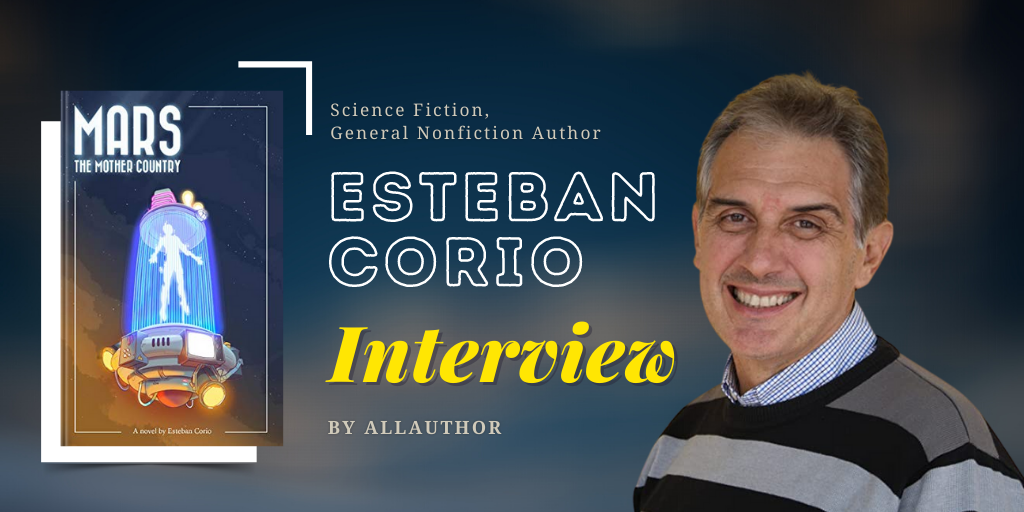 What is something that you really miss from your childhood?
What is something that you really miss from your childhood?
A simpler life… the only amazing technology back then were those of Star Trek on TV, or the first availability of a transistor-based radio, or even color TV. I had plenty of time to get along with friends in the streets, played soccer, smoked the first cigarette on the shadows…Those times are forever gone. Today, the world is extremely demanding and overwhelming, even for kids.
At what age did you write your first book? Did it gets published?My very first book was not a book itself, but a journey plan for a 2 week long trip on a motor boat, traversing the Parana River northbound. I was 8 years old at that time. I remember having employed almost two months accounting every detail of the trip. Stop overs, supplies, places to visit. Notably, I didn´t elaborate anything about how to pay my uncle (the boat´s owner) for the ride.
What developed your interest in the latest developments in sciences like Astronomy, Physics, Mathematics, and Archeology?Simple fascination and a certain disdain for other sciences. My first choice was always Astronomy. I am a baby boomer. Men set a foot at the Moon when I was only 9 years old, so I was mesmerized by the achievement and automatically turned my eyes to the skies every time I could. Then, during High school, I selected a Technical tuition that introduces me to the fantastic and down-to-earth concepts of Physics and Mathematics. Archeology, however, is not an exact science, but after 10+ seasons of watching Ancient Aliens at the History Channel, I concluded that this Science may have the key to understand our true origins ( not precisely the standard, off-the-shelf official story that they use to teach us)
Who are the people that have influenced you as an author? Are you inspired by any other author specifically?Certainly many authors. In a sort of chronological order : Emilio Salgari, Isaac Asimov, Clive Cussler, Arthur C. Clarke, Agatha Christie, Erle Stanley Gardner. There are many more but I could say that my writing style (if there is one) has some elements of above monsters of the fiction.
What developed your interest particularly in science fiction?Again, a central part of the equation is on the side of Star Trek. That is in the core of my love for the genre. To this day, I regularly watch old classics and new releases. Then, the likes of Star Wars, The Ring World, The Foundation Series, Rama also weighted in.
But what I want to point out that Star Trek brought me two fundamental things that made me absolutely addicted:
The concept of situational leadership. Besides the rest of the crew, I was always focused in the captain figure and how she/he dealt with a lot of situations including perils, predicaments, difficult or almost impossible decisions, charity, cruelty, bargaining, and emotions. It was so enlighten that during most of my career as a corporate executive in companies like Intel, Compaq, HP , Samsung and AT&T I frequently used many lessons learnt from these series in real life situations.
The anticipative technology. It is wonderful to assess that many of the technology concepts laid during many of the ST episodes have seen the light in subsequent years.
What is something everyone can learn from your former and first book "El Bien Hacer"?“El Bien Hacer” is a book title that´s a bit hard to translate into English. It may be something like “Doing Right”. It was my first book and it was supposed to be a counterpart of another book called “Being well” to be written by a friend, but it didn´t happen. So I decided to release it alone. It is neither a fiction tale nor a novel; it reflects my lifetime learning with respect of life, marriage, career, raising kids and how to reach an enjoyable and healthy third age. I don´t think I will translate into English, partly because its target readers are my fellow nationals and may be other Latin-Americans. I had the opportunity to live outside Argentina, my home country, and also developed relationship with many individuals of diverse cultures, and this book is not precisely a global recipe, so to speak.
What inspired the plot of your first novel, "Mars. The mother country"?There were basically three elements that produced a click in my mind and sometime along the way I realized that it could be a good idea to combine them into a plot.
The first element is a revolutionary theory presented by Dr. John Brandenburg in his book “Death on Mars – The discovery of a planetary nuclear massacre” where he postulated the possibility of the existence of an ancient and advanced civilization in Mars that was wiped out of existence by another alien race by detonating two large nuclear weapons a couple of thousand meters above the surface. For me, to think about the possibility of an ancient civilization so near our planet in the distant past, obliterated so suddenly, ignited the idea of “What happens if some of those Martian guys could escape the fate and went to earth, somehow mingling with the earthlings of that epoch? Enter the Annunaki and the likes.
The second element was that I wanted to transcend the usual global entente between US, China, Russia, India, EU and other countries that basically are preventing global society to find another way to coexist productively and in good faith. So I empowered the UN as the supreme office dealing with alien races and helping humanity to align after a common goal of global development and enhanced spirituality.
The third element was the ever appealing concept of time travel, added to the idea of parallel universes. It constitutes an enticing avenue to traverse and make things happen, then happen again the same way, or change things while keeping the Mother timeline, as I defined, unaltered for the plot purposes.
How do you think parents and teachers can develop the interest of reading in children?I think that both parents and teachers have to “walk the talk”. In other words, you can only inspire by actually leading the way. Instead of employing time consuming daily news, following the latest developments in the life of actors or actresses, engaging in futile political discussions, just read books. And start debating with the kids about what you have read. There is a fantastic book by Dr. Sherry Turkle called “Reclaiming conversation – the power of talk in a digital age” where she encourages open, face-to-face dialog with kids. What could be better to discuss this or that book with them, awakening their desire to read more?
How were English names translated into Spanish translating your book, MARS The mother country?Actually it was the other way around. I wrote the novel in Spanish and I decided to go for the English speaking market by translating it with the assistance of a professional translator. One of the premises of the book is the diversity of nationalities and races (including alien races), so some of the names are English (like Kevin, Marjorie and others), some others in Indi and Spanish. Even some of the alien names follows Klingon grammar .
Do your book ideas usually start with the characters, story/plot, historical events, or something else?I would say that, until now, with two books published and one more about to be edited, my experience indicates that I start imagining the beginning and the end, then the rest of the pieces start falling in the table.
Do you prefer it when all the books in a series can be read as standalone? Or do you like to tie a connective thread through all the books?Hard to tell. I would say that I am comfortable with both ways. The Foundation series by Asimov is a clear example. Each book of the series has its own identity and can perfectly go as standalone; however the connective thread between them is appealing. The secret of this work is the expanse, or time-lapse between books. It´s so huge that you necessarily need to develop a kind of stand-alone plot for each of them; however Asimov managed brilliantly to connect them all over several millennia. On the other hand, I can´t stop thinking about what happened with the sequels of The Ring World, by Larry Niven. The first book was so terrific and page-turner that he may have been invited –or politely forcedto write a couple of sequels. None of them were close in quality and consistency of the first one.
About my case, Mars The mother Country ends in a way that would allow me to continue with the plot, however I will probably choose to develop another subplot in the next novels, not so far with the original idea but also not so close.
What is the sweetest fan-mail that you have ever received?It came from my elder daughter, Hanae, who lives in Switzerland. She was proud of my work and – as the dream of many dads – she called me her “hero”.
What is the most hilarious thing you did out of boredom, apart from writing?I have two great pastimes –besides writing- that helped me a lot especially during this troublesome year and the associated lockdown: Playing classic guitar and solve crosswords. I am also an avid trail runner, so I am counting the days to go outdoors for a race.
What's the strangest thing you have ever had to research online for your book?I wouldn´t said “strange” but when I had to establish a part of the plot in certain areas of Mars, I wanted to make sure that all distances, terrain features and locations were to be exactly stated. So I employed Google Earth – Mars. It´s a great and reliable tool to help your writing to be precise and bulletproof.
How was the transition from hard-copy reading to e-book reading?In my case, it is not a transition, but a back and forth experience. Each way of reading has its own uniqueness. I couldn´t put down any of the old good pack of pages, some of them showing yellow aging as you turn them enjoying a liquor by the fireplace. But such an experience is hard to replicate when you travel by business or work and need lightweight stuff and practicality.
Which is the next book you are working on? Is it a series or a stand-alone book?My next book –also a SciFi novel- is already finished. I will publish it in Spanish within the next weeks after I am satisfied with the cover art that I asked an artist to create. This novel is somehow connected to the first one, although it is developed a couple of decades after the events of my first book and it is entirely about time travel. One of the things that I realized from Mars The mother country is that time travel to past is perfectly compatible with the concept of Historical Revisionism without any of intervention or alteration. It is just to understand firsthand how things really happened, especially all those events that boldly changed the course of our evolution or civilization. But, what happens if some goes wrong when you visit that place and time?... The title of the novel will be "Travesia al pasado". After a few weeks of its publishing in Spanish, I plan to translate it to English. Its title will be "Journey to the past”
How has been your experience working with AllAuthor?The experience has been amazing! SciFi writing is traditionally a well traversed territory for English writers. All masterworks are from that origin. It doesn´t mean that Spain or Latin America are devoid of good writers. Not at all. For instance, in Argentina we have a truly masterwork in a form of a comic called “El Eternauta”, a history of an alien invasion in our country, back in 1958. It is very inspirational.
But I wanted to have my works available in the main English markets. This was quite a challenge. Lucky me, I found in All Author a partner that facilitated me to transcend, to reach readers and other fellow writers.
I was also very happy to have achieved the top preference in September 2020 for my Book Cover art. Not to mention the mock ups, the twitter outbound messages. In a word, a very good companion for a beginner writer that wants his work to be as much available and known as possible.
Author of exciting and well-researched science fiction novels, Esteban Corio knows how to keep the readers hooked with every word he writes. His first choice was always Astronomy. His very first book was not a book itself, but a journey plan for a 2 week-long trip on a motorboat. His former and first book "El Bien Hacer", published by KDP in 2019, contains reflections about many life experiences. He has two great time pastimes: playing classic guitar and solve crosswords.
